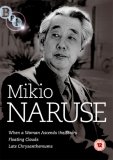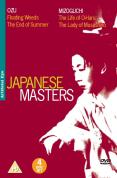 Kwaidan (Masters of Cinema) Standard Edition Blu-ray | Blu Ray | (14/09/2020)
from £14.99
| Saving you £N/A (N/A%)
| RRP
Kwaidan (Masters of Cinema) Standard Edition Blu-ray | Blu Ray | (14/09/2020)
from £14.99
| Saving you £N/A (N/A%)
| RRP Winner of the Special Jury Prize at Cannes, Kwaidan features four nightmarish tales adapted from Lafcadio Hearn's classic Japanese ghost stories about mortals caught up in forces beyond their comprehension when the supernatural world intervenes in their lives: The Black Hair, The Woman of the Snow, Hoichi the Earless, and In a Cup of Tea. Breathtakingly photographed entirely on hand-painted sets, the film is an abstract wash of luminescent colours from another world. The Masters of Cinema Series is proud to present the complete 183-minute original Japanese cut of Masaki Kobayashi's masterpiece on Blu-ray. Special Features: 1080p presentation on Blu-ray from Criterion's 2K digital restoration of Kobayashi's original director's cut Original monaural Japanese soundtrack Optional English subtitles Kim Newman on Kwaidan a new interview with the film critic and writer Shadowings [35 mins] a new video essay by David Cairns and Fiona Watson Original trailers PLUS: A collector's booklet featuring reprints of Lafcadio Hearn's original ghost stories; a survey of the life and career of Masaki Kobayashi by Linda Hoaglund ; and a wide ranging interview with the filmmaker, the last he'd ever give
 (DVD & BLU-RAY DUAL FORMAT)](/pictures/1117548.jpg) FLOATING WEEDS | Blu Ray | (03/12/2012)
from £N/A
| Saving you £N/A (N/A%)
| RRP
FLOATING WEEDS | Blu Ray | (03/12/2012)
from £N/A
| Saving you £N/A (N/A%)
| RRP Towards the end of his career, Japanese master Yasujiro Ozu (Tokyo Story; Late Spring; Early Summer; An Autumn Afternoon; Good Morning) returned to a story he had made some 25 years earlier as a silent, Ukigusa monogatari [A Story of Floating Weeds], for a magnificent colour reworking, photographed by legendary cinematographer Kazuo Miyagawa (Rashomon, Ugetsu monogatari).When a travelling theatre troupe brings their show to a seaside port, Komajuro (Ganjiro Nakamura), an ageing actor, is reunited with his former lover, sake bar owner Oyoshi (Haruko Sugimura), and his illegitimate son Kiyoshi (Hiroshi Kawaguchi), to the distress of his current mistress Sumiko (Machiko Kyo).From this simple scenario, Ozu builds, one exquisite image at a time, a saga of profound humanity and rich understanding. Encompassing a novelistic range of emotions and tones with the utmost delicacy, Floating Weeds stands tall even amidst a body of work as extraordinary as Ozu's. Making its worldwide Blu-ray debut, The Masters of Cinema Series is proud to present Floating Weeds in a beautiful new high-definition restoration.
 Kwaidan (Masters of Cinema) Limited Edition Blu-ray | Blu Ray | (27/04/2020)
from £N/A
| Saving you £N/A (N/A%)
| RRP
Kwaidan (Masters of Cinema) Limited Edition Blu-ray | Blu Ray | (27/04/2020)
from £N/A
| Saving you £N/A (N/A%)
| RRP Winner of the Special Jury Prize at Cannes, Kwaidan features four nightmarish tales adapted from Lafcadio Hearn's classic Japanese ghost stories about mortals caught up in forces beyond their comprehension when the supernatural world intervenes in their lives: The Black Hair, The Woman of the Snow, Hoichi the Earless, and In a Cup of Tea. Breathtakingly photographed entirely on hand-painted sets, the film is an abstract wash of luminescent colours from another world. The Masters of Cinema Series is proud to present the complete 183-minute original Japanese cut of Masaki Kobayashi's masterpiece on Blu-ray for the first time in the UK. SPECIAL FEATURES Hardbound Slipcase 1080p presentation on Blu-ray from Criterion's 2K digital restoration of Kobayashi's original director's cut Original monaural Japanese soundtrack Optional English subtitles Kim Newman on Kwaidan a new interview with the film critic and writer Shadowings [35 mins] a new video essay by David Cairns and Fiona Watson Original trailers PLUS 100-PAGE Perfect Bound Illustrated Collector's book featuring reprints of Lafcadio Hearn's original ghost stories; a survey of the life and career of Masaki Kobayashi by Linda Hoaglund; and a wide ranging interview with the film maker the last he'd ever give
![Floating Weeds [1959]](/pictures/1012087.jpg) Floating Weeds | DVD | (26/01/2004)
from £N/A
| Saving you £N/A (N/A%)
| RRP
Floating Weeds | DVD | (26/01/2004)
from £N/A
| Saving you £N/A (N/A%)
| RRP Floating Weeds is one of the final films directed by the legendary Japanese filmmaker Yasujiro Ozu. A remake of one of his own silent features it tells the story of a travelling Kabuki acting troupe led by Komajuro who arrive in a small coastal town. There Komajuro is reunited with his former lover Oyoshi and their illegitimate son who is unaware that the itinerant actor is his father. But the reunion provokes the jealousy of Sumiko Komanjuro's current mistress who plots a devas
 Mikio Naruse Collection | DVD | (26/11/2007)
from £149.90
| Saving you £-104.91 (N/A%)
| RRP
Mikio Naruse Collection | DVD | (26/11/2007)
from £149.90
| Saving you £-104.91 (N/A%)
| RRP Titles Comprise: 1. When a Woman Ascends the Stairs (Onna ga kaidan o agaru toki) (1960) 2. Floating Clouds (Ukigumo) (1955) 3. Late Chrysanthemums (Bangiku) (1958)
![Samurai Assassin [1965]](/pictures/1003570.jpg) Samurai Assassin | DVD | (02/02/2003)
from £N/A
| Saving you £N/A (N/A%)
| RRP
Samurai Assassin | DVD | (02/02/2003)
from £N/A
| Saving you £N/A (N/A%)
| RRP Threatened from the East and West Japan and the Tokugawa Shogunate are dangerously unstable. Lord Li Naosuke the 'Red Devil' has raised up a puppet figure to become the Shogun lemoshil. The year is 1860. Among his opposition is the Mito Clan. Undefeated they are planning his assassination. Amongst their numbers is one Niiro Tsurichiyo (Toshiro Mifune). The illegitimate son of a powerful nobleman Niiro has been brought up in a merchants household harbouring ambitions to bec
![The End Of Summer [1961]](/pictures/1012088.jpg) The End Of Summer | DVD | (26/01/2004)
from £N/A
| Saving you £N/A (N/A%)
| RRP
The End Of Summer | DVD | (26/01/2004)
from £N/A
| Saving you £N/A (N/A%)
| RRP This penultimate film by Japanese master director Yasujiro Ozu examines the difficulties faced by the Kohayagawa family as they struggle to adapt their traditional values to a rapidly changing post-war Japan. As the family's generations-old sake making business begins to fail in the face of increasingly fierce competition Manbei the incorrigible elderly patriarch rekindles an affair with an old flame much to the disapproval of his daughter Fumiko. He is further distracted by his a
 The Japanese Masters Collection | DVD | (09/10/2006)
from £N/A
| Saving you £N/A (N/A%)
| RRP
The Japanese Masters Collection | DVD | (09/10/2006)
from £N/A
| Saving you £N/A (N/A%)
| RRP Floating Weeds (Dir. Yasujiro Ozu 1959): Floating Weeds is one of the final films directed by the legendary Japanese filmmaker Yasujiro Ozu. A remake of one of his own silent features it tells the story of a travelling Kabuki acting troupe led by Komajuro who arrive in a small coastal town. There Komajuro is reunited with his former lover Oyoshi and their illegitimate son who is unaware that the itinerant actor is his father. But the reunion provokes the jealousy of Sumiko Komanjuro's current mistress who plots a devastating revenge. Beautifully composed and surperbly played 'Floating Weeds' is one of Ozu's most affecting poignant and powerful films. The End Of Summer (Dir. Yasujiro Ozu 1961): This penultimate film by Japanese master director Yasujiro Ozu examines the difficulties faced by the Kohayagawa family as they struggle to adapt their traditional values to a rapidly changing post-war Japan. As the family's generations-old sake making business begins to fail in the face of increasingly fierce competition Manbei the incorrigible elderly patriarch rekindles an affair with an old flame much to the disapproval of his daughter Fumiko. He is further distracted by his attempts to marry off his other two daughters: Akiko the eldest and a widow with a small son and Noriko the youngest who is still single. A sublime bittersweet elegy for a vanishing world The End of Summer is beautifully shot in muted colour elegantly acted and masterfully directed by one of the 20th Century's greatest filmmakers. The Lady of Musashino (Dir. Kenji Mizoguchi 1951): Mizoguchi's dissection of the Japanese reaction to the aftermath of war as a fastidiously moral woman faces upheaval with the changing times brought about by the new post-Imperial period... The Life of Oharu (Dir. Kenji Mizoguchi 1952): In feudal Japan the daughter of a samurai Oharu falls in love with a man below her station. Expelled from the castle in Kyoto her family tries to regain respectability but Oharu is forced into a new life as a concubine and then a fallen woman ever hoping to preserve some semblance of purity in a corrupt world...
 (DVD)](/pictures/1117547.jpg) FLOATING WEEDS | DVD | (03/12/2012)
from £22.93
| Saving you £-5.94 (N/A%)
| RRP
FLOATING WEEDS | DVD | (03/12/2012)
from £22.93
| Saving you £-5.94 (N/A%)
| RRP Towards the end of his career, Japanese master Yasujiro Ozu (Tokyo Story; Late Spring; Early Summer; An Autumn Afternoon; Good Morning) returned to a story he had made some 25 years earlier as a silent, Ukigusa monogatari [A Story of Floating Weeds], for a magnificent colour reworking, photographed by legendary cinematographer Kazuo Miyagawa (Rashomon, Ugetsu monogatari).When a travelling theatre troupe brings their show to a seaside port, Komajuro (Ganjiro Nakamura), an ageing actor, is reunited with his former lover, sake bar owner Oyoshi (Haruko Sugimura), and his illegitimate son Kiyoshi (Hiroshi Kawaguchi), to the distress of his current mistress Sumiko (Machiko Kyo).From this simple scenario, Ozu builds, one exquisite image at a time, a saga of profound humanity and rich understanding. Encompassing a novelistic range of emotions and tones with the utmost delicacy, Floating Weeds stands tall even amidst a body of work as extraordinary as Ozu's. Making its worldwide Blu-ray debut, The Masters of Cinema Series is proud to present Floating Weeds in a beautiful new high-definition restoration.

Please wait. Loading...
This site uses cookies.
More details in our privacy policy